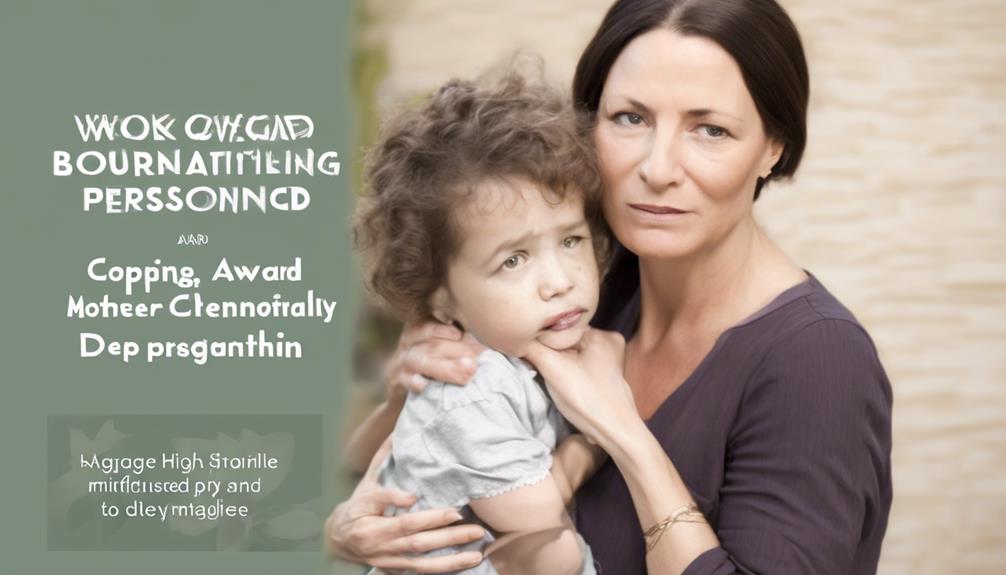Picture a scenario in which a mother, displaying symptoms of Borderline Personality Disorder, faces difficulties in managing her emotions, resulting in frequent fits of anger and erratic behavior. This scenario can pose a challenge for her child, affecting their emotional health and feeling of safety.
Understanding the complexities of this situation is crucial in fostering empathy and support for both the mother and the child. By exploring effective strategies and interventions, we can strive to promote healing and healthier family dynamics in the face of such challenges.
Key Takeaways
- Inconsistent parenting impacts children's emotional development and secure attachment.
- Understanding triggers and patterns crucial for managing intense mood swings.
- Setting boundaries and clear communication vital for stable relationships.
- Seeking support, therapy, and education essential for coping with daily challenges.
Impact on Parenting Dynamics
How do children fare when raised by mothers exhibiting symptoms of borderline personality disorder, impacting the dynamics of parenting? Children of mothers with BPD often face challenges due to inconsistent parenting practices that stem from the emotional dysregulation experienced by their mothers. The erratic emotional landscape created by a mother with BPD can lead to unpredictable responses and extreme reactions, leaving children feeling insecure and unsure about the stability of their environment. This inconsistent parenting style can hinder the emotional development of children, as they may struggle to form a secure attachment and a sense of trust in their caregiver.
Moreover, witnessing impulsive behaviors and intense mood swings in a mother with BPD can further exacerbate a child's feelings of insecurity and instability. The chaotic environment that often characterizes households with a mother suffering from BPD can impact the overall well-being of the child, creating a sense of unease and stress. In essence, the parenting dynamics shaped by a mother with BPD can significantly influence a child's emotional growth and sense of stability.
Managing Intense Mood Swings

Children of mothers with borderline personality disorder often navigate a challenging environment characterized by unpredictable emotional reactions and behaviors, particularly intense mood swings, necessitating effective strategies for managing these fluctuations. When dealing with intense mood swings, understanding triggers and patterns becomes crucial in developing coping mechanisms. Incorporating mindfulness techniques and emotion regulation skills can help in navigating these emotional highs and lows. Therapy, especially Dialectical Behavior Therapy (DBT), provides a structured approach for mothers with BPD to learn how to regulate their intense mood fluctuations. By recognizing the signs of escalating emotions, individuals can intervene early using learned skills to prevent extreme mood swings. The table below outlines some key strategies for managing intense mood swings:
| Coping Strategies | Mindfulness Techniques | Emotion Regulation Skills |
|---|---|---|
| Identify triggers | Practice deep breathing | Develop distress tolerance |
| Create a calming environment | Engage in meditation | Implement positive self-talk |
| Establish a support network | Stay present in the moment | Use grounding techniques |
Building Stable Relationships
Establishing clear boundaries and practicing consistent communication are essential in building stable relationships with a mother exhibiting borderline personality disorder symptoms. When navigating relationships with a mother affected by BPD, it's crucial to:
- Set Boundaries: Clearly define personal limits and communicate them effectively to maintain a healthy relationship dynamic. Boundaries help manage expectations and promote mutual respect.
- Practice Empathy: Understanding the impact of BPD symptoms on your mother's behavior can foster empathy and compassion. Acknowledging her struggles without enabling negative patterns is key to building trust and connection.
- Seek Therapy: Engaging in therapy or counseling can provide valuable tools for coping with challenges and improving communication. Professional guidance can enhance your ability to navigate difficult situations and strengthen the bond with your mother while prioritizing your emotional well-being.
Coping Strategies for Daily Challenges

To effectively navigate the daily challenges of living with a mother exhibiting symptoms of borderline personality disorder, it is crucial to implement practical coping strategies that prioritize mental and emotional well-being. Establishing healthy boundaries with your BPD mother is essential for safeguarding your emotional health. Communicate your needs assertively and engage in self-care activities like journaling or exercise to recharge from challenging interactions. Educate yourself about BPD to foster empathy and understanding towards your mother's behaviors. Seeking support from a therapist or a support group can provide you with coping strategies and validation in managing the complexities of having a BPD mother. Additionally, practicing mindfulness techniques such as deep breathing and grounding exercises can help you manage overwhelming emotions and stay present in the moment.
| Coping Strategies | Description |
|---|---|
| Boundaries | Establish clear boundaries with your BPD mother to protect your well-being. |
| Self-Care | Engage in activities like journaling and exercise to prioritize your needs. |
| Therapist Support | Seek guidance from a therapist or support group for coping strategies and validation. |
Seeking Support and Understanding
Understanding the complexities of borderline personality disorder symptoms in a mother is crucial for providing effective support and seeking appropriate resources. When seeking support and understanding for a mother with borderline personality disorder symptoms, it's essential to consider the following:
- Therapy Options: Exploring professional therapy approaches like schema-focused therapy and mentalization-based therapy can be instrumental in addressing the emotional needs of mothers with borderline personality disorder symptoms.
- Building a Supportive Network: Creating a network of understanding individuals and seeking resources tailored to borderline personality disorder can significantly contribute to the well-being of both the mother and her family.
- Educating Oneself: Taking the time to educate oneself about borderline personality disorder symptoms and their impact on a mother can enhance communication, foster empathy, and ultimately lead to better outcomes for the mother and her children.
Frequently Asked Questions
What Is It Like to Have a Mother With Borderline Personality Disorder?
Living with a mother who's Borderline Personality Disorder can bring a range of challenges. We navigate through constant emotional turbulence, shifting between feelings of idealization and devaluation. This instability impacts our sense of self and emotional well-being.
Our experiences may include a lack of consistency, difficulty setting boundaries, and struggles with attachment. Seeking support and understanding can be essential in coping with the complexities of this situation and fostering resilience.
How Do Borderline Mothers Treat Their Daughters?
Borderline mothers may treat their daughters with a mix of idealization and devaluation, leading to intense and unstable relationships. They might exhibit emotional manipulation, guilt-tripping, and unpredictable behavior, making it challenging for daughters to feel secure.
Providing consistent emotional support can be a struggle for borderline mothers, leaving daughters feeling neglected or criticized. Walking on eggshells due to their mother's erratic behavior can create a constant state of anxiety and fear for daughters.
How Can I Tell if My Mom Has Bpd?
We can identify signs of BPD in our loved ones by observing their behavior for patterns such as intense mood swings, fear of abandonment, impulsivity, and unstable relationships.
It's crucial to pay attention to extreme reactions to rejection, self-harming tendencies, chronic feelings of emptiness, and distorted self-image.
Seeking professional help is vital for a proper diagnosis and treatment plan, benefiting both the individual and their relationships.
Do Borderlines Love Their Children?
Yes, borderlines can love their children deeply. However, their emotional instability and fear of abandonment may affect their ability to express love consistently.
The intense emotions and impulsivity associated with BPD can create challenges in nurturing effectively. Understanding these dynamics can help navigate complex relationships with borderline parents.
While love may be present, it can be expressed in ways that may be confusing or inconsistent due to the symptoms of BPD.
Conclusion
In conclusion, navigating a relationship with a mother exhibiting Borderline Personality Disorder symptoms can be challenging. As the saying goes, 'knowledge is power,' understanding the impact of these symptoms is essential in managing and healing from the effects on both the parent and child.
By seeking support, setting boundaries, and practicing self-care, individuals can work towards building healthier dynamics and relationships within the family unit.









